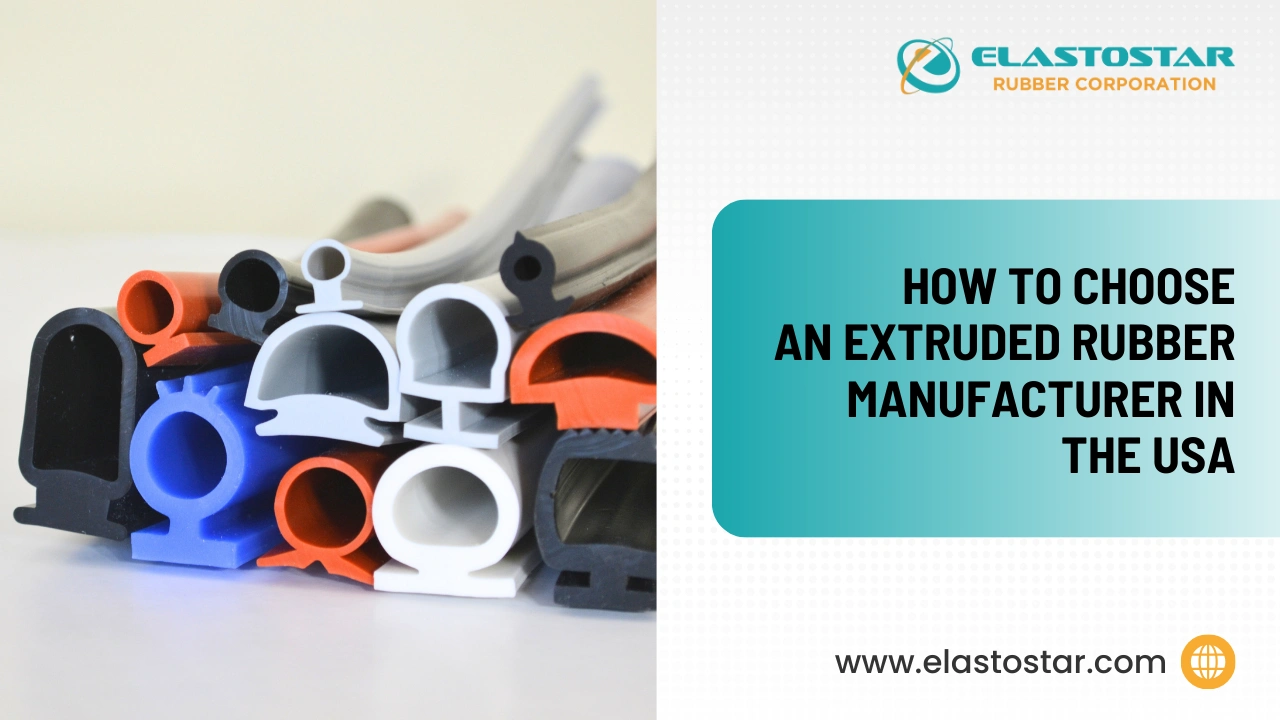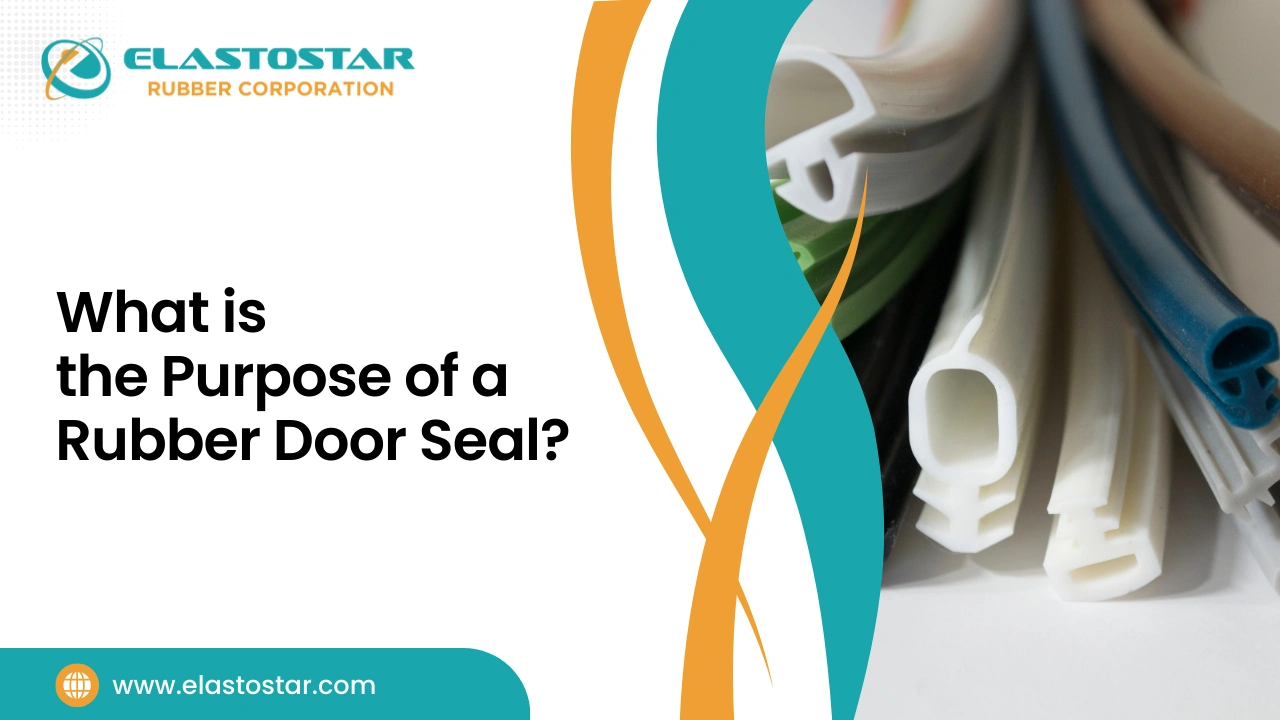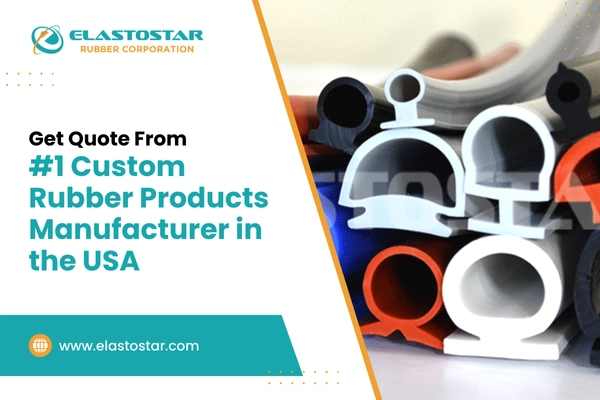Silicone products find use in the automotive, manufacturing, food processing, and pharmaceutical industries due to their durability, flexibility, and resistance to extreme temperatures. They are utilized to produce high-quality custom rubber seals and various industrial gaskets.
The manufacturing process helps businesses select the right materials to create durable products. Precision is key to producing reliable components, and working with experienced custom seal manufacturers leads to high-quality results. Silicone rubber gaskets and seals protect medical devices and machinery.
This guide explains the process of making silicone and transforming it into finished products.
What is Silicone?
Silicone Rubber is a flexible, durable material made from silicon materials combined with oxygen, hydrogen, and carbon. It is widely used in industries because of its heat resistance, water repellency, and ability to maintain shape over time. Many people confuse silicone or rubber, but they are different.
Silicone is a synthetic polymer that stays stable under extreme conditions, while rubber is a natural or synthetic material that is more elastic but less resistant to heat and chemicals.
This makes silicone gaskets preferred for seals, gaskets, and other high-performance industrial products.
Read More – Silicone Rubber: Where It Comes From
How is Silicone Produced?
At Elastostar Rubber Corporation, we follow a precise and high-quality process to manufacture silicone for various industrial applications.
Our expertise in rubber extrusion profiles and custom rubber extrusions produces durable, high-performance products.
Silicone Production Process
| Step | Process Description |
| 1. Isolating Silicone | Silicon is extracted from sand by heating. |
| 2. Mixing | Silicon is mixed with methyl chloride. |
| 3. Distillation | Impurities are removed to purify silicone. |
| 4. Adding Water | Water is added to make silicone flexible. |
| 5. Polymerization | Silicone is processed into rubber products. |
From Raw Material to Finished Product – The Manufacturing Process
1. Material Selection
At Elastostar Rubber Corporation, selecting the right silicone material is critical to manufacturing high-quality products. The choice of material impacts custom extruded rubber components’ durability, flexibility, and performance.
Choosing the Right Silicone Material
Different industries require specific types of silicone-based on their needs.
For example-
- Medical-grade silicone is used for healthcare applications.
- High-temperature silicone is ideal for automotive and industrial uses.
- Food-grade silicone meets FDA standards for food processing industries and seals.
Factors Affecting Material Properties
Several factors influence the quality and performance of the custom rubber product manufacturer materials;
- Temperature Resistance – Can handle extreme heat and cold.
- Flexibility & Hardness – Varies based on durometer requirements.
- Chemical Resistance – Protects against oils, solvents, and other chemicals.
- Tensile Strength – Ensures durability under stress.
We develop long-lasting, high-performance products for various industries by selecting the right extruded silicone formulation.
2. Mold Design and Preparation
Mold design is a step in manufacturing high-quality silicone products, a well-crafted mold with precision, durability, and efficiency in production.
For custom die-cut gaskets, selecting the right mold is crucial for achieving the best results.
Types of Molds Used in Silicone Molding
Different molding techniques require specific types of molds, including
- Compression Molds – These create solid silicone components with high durability.
- Injection Molds – Ideal for complex shapes and high-volume production.
- Transfer Molds – Suitable for detailed designs and precision sealing solutions.
- Extrusion Dies – Used for manufacturing continuous profiles like extruded rubber sealing strips.
Elastostar supports businesses from prototype to full production run, ensuring that each product meets exact industry standards.
Customization in Mold Design
Customization is to produce unique and high-performance silicone products. Factors considered in mold design include
- Shape and Size Requirements – Accurate dimensions for custom extruded rubber profiles.
- Material Compatibility – Selecting the right mold material to enhance durability.
- Precision and Tolerance – Designing molds with tight tolerances for better sealing performance.
Advanced molding techniques and high-quality materials ensure that every product meets the highest industry standards.
3. Mixing and Compounding
Mixing and compounding are critical steps in silicone manufacturing. The final product must meet performance requirements for different industries.
Silicone can be customized for strength, flexibility, color, and other properties by incorporating additives and pigments.
Incorporating Additives and Pigments
- Color Pigments – Used to match industry or brand-specific colors.
- Reinforcing Agents – Improve durability and resistance.
- Catalysts & Curing Agents – Improves curing time and strength.
- FDA-Approved Additives – Compliance for food and medical use, such as FDA-approved rubber and FDA O-rings.
Customizing Silicone for Industry-Specific Needs
- Medical & Food-Grade Silicone is Safe and compliant with FDA-approved seals.
- High-temperature silicone is Used in automotive and industrial applications.
- Electrically Conductive Silicone is Ideal for sealing and electronics applications.
4. Molding Processes
Different molding techniques shape silicone into various products, including extruded gaskets and industrial seals.
Injection Molding
- Best for high-volume production.
- Produces complex, precise silicone components.
Compression Molding
- Used for large, solid silicone parts.
- Cost-effective for low to medium production runs.
Transfer Molding
- Combines the benefits of compression and injection molding.
- Ideal for detailed designs and reinforced parts.
Extrusion
- Used to create continuous profiles.
- Produces long, uniform seals and tubing.
Each molding process is selected based on the product’s design, function, and industry standards.
5. Post-Molding Operations
Once the molding is complete, additional steps ensure the final product meets quality and performance standards.
Trimming and Deflashing
- Removes excess material to create a clean finish.
- Precision for custom rubber seals.
Post-Curing
- Heat treatment enhances silicone properties.
- Improves durability and performance.
Quality Inspection
- Checks for defects and ensures compliance with industry standards.
- Guarantees high-performance custom seals for various applications.
Post-molding operations are for delivering high-quality silicone products that meet customer and regulatory requirements.
Elastostar guarantees the shortest lead time delivery to meet customer demands without compromising quality.
Read More – Elastostar’s Silicone Rubber Extrusion Manufacturing Process
Ensuring Quality in Silicone Manufacturing
Maintaining high standards in silicone manufacturing is essential for producing durable and reliable products. Rigorous testing ensures that materials, such as extruded rubber molded parts, meet industry requirements for performance and longevity.
How do We Test for Strength and Durability?
- Tensile Testing
It measures the force required to break the material and can handle stress in various applications. - Compression Set Testing
Evaluate how well the material returns to its original shape after compression, which is important for sealing solutions used in industrial applications. - Durometer Hardness Testing
Determines the material’s hardness level, helping to select the right type for different uses, including silicone rubber cord designed for flexibility and strength. - Extractables Testing
Checks for substances that might leach from the material in sensitive applications such as food, pharmaceutical, and medicine products.
Why Compliance Matters?
- Industry certifications such as FDA, ASTM, and ISO that materials meet safety and performance standards.
- Quality control helps reduce defects and improve durability and reliability in demanding applications.
By following strict testing and compliance protocols, silicone rubber manufacturers can deliver high-quality silicone products that perform efficiently across various industries.
What are the Best Applications of Silicone Products?
Silicone tube is a versatile material used across various industries due to its durability, flexibility, and resistance to extreme conditions.
Here are some common applications;
1. Automotive Industry
Gasket sponges are critical in the automotive sector, providing high-performance components like engine seals, gaskets, and hoses. These products have excellent resistance to heat, oil, and chemicals, so vehicles maintain their performance over time.
2. Medical and Healthcare
It is widely used in medical applications, particularly for FDA-approved medical-grade silicone products such as tubing, implants, and seals. Its biocompatibility and ability to bear sterilization make it ideal for life-saving equipment and devices.
3. Electronics
Silicone seal is used in the electronics industry for seals, keypads, and thermal insulation. Its heat resistance and insulating properties help protect sensitive components from heat and moisture, improving the lifespan and performance of electronic devices.
Elastostar’s Commitment to Environmental and Safety Standards
Silicone manufacturing involves both environmental responsibility and strict FDA safety standards.
At Elastostar Rubber Corporation, we are committed to sustainable practices, and our operations meet and exceed industry regulations.
1. Sustainability in Silicone Manufacturing
Recycling is a key part of Elastostar’s eco-friendly approach. By reusing silicone scraps, we reduce waste and lower our environmental footprint.
We also implement energy-efficient processes and choose environmentally safe materials, which helps minimize industrial waste while conserving resources.
2. Safety Protocols and Regulations
Elastostar adheres to rigorous industry standards and certifications for safe and reliable products. Our FDA-approved rubber components are manufactured under strict safety protocols. We emphasize workplace safety by providing comprehensive training and protective equipment while maintaining a secure environment for our team.
By prioritizing sustainability and safety, Elastostar is dedicated to responsibly providing high-quality silicone products.
Why is Elastostar the right choice for Silicone Manufacturing?
At Elastostar Rubber Corporation, we produce high-quality silicone products engineered for durability, flexibility, and compliance with industry standards. We focus on custom rubber seals, extruded gaskets, and high-performance silicone components for various industry applications.
As one of the leading rubber extruder manufacturers, our materials are tested with USP Class VI & Section 88 & 87 pass for safety and reliability. We emphasize eco-friendly manufacturing, strict quality control, and workplace safety to deliver superior products with the shortest lead time delivery.
Our expertise extends to reverse engineering, precise replicating, and enhancing existing components.
Our silicone solutions provide long-term performance for the automotive, medical, pharmaceutical, and electronics industries. Contact us today for custom silicone solutions that meet your needs. Our team is ready to assist you!
Recommended Reads
- How is Silicone Rubber Used in the Medical & Pharmaceutical Industry?
- Top Applications of FDA Silicone Rubber in Food Processing Industries
- Elastostar’s Silicone Rubber Extrusion Manufacturing Process
Conclusion
Silicone manufacturing involves a precise process, from selecting raw materials to molding and final inspection. Each step guarantees that products such as silicone rubber gaskets are durable, flexible, and resistant to extreme conditions. Quality control, which involves rigorous testing of strength, hardness, and performance, is crucial for maintaining industry standards.
At Elastostar Rubber Corporation, we are committed to producing high-quality silicone rubber gaskets for pharmaceutical, automotive, medical, and food processing industries. With advanced technology, strict quality measures, and a focus on sustainability, we remain a trusted partner in silicone manufacturing.
FAQs
What is the manufacturing process of silicone?
Our process begins with extracting silicon from silica (sand) and mixing it with methyl chloride. After distillation and polymerization, the material is processed into various silicone products, such as silicone rubber gaskets and extruded seals.
Where is silicon manufactured in the US?
Silicon is produced in various locations across the US, with significant manufacturing hubs in states like Ohio, West Virginia, and Alabama. At Elastostar Rubber Corporation, we manufacture durable and industry-specific products with high-quality silicone materials.
What are the raw materials for silicone?
Silicone is made from silicon, oxygen, hydrogen, and carbon. We enhance our materials with additives like pigments, reinforcing, and curing agents to ensure durability, flexibility, and industry compliance for FDA-approved rubber and industrial applications.
How is silicon made step by step?
Silica (sand) is heated with carbon in an electric furnace.
The reaction produces pure silicon.
We refine the silicon and mix it with other elements for specific applications.
It is then used to manufacture high-performance materials like custom rubber seals and silicone-based components.
What are the raw materials for silicon production?
The primary raw material for silicon production is silica (SiO₂), which we extract from sand or quartz. Carbon sources such as coal or wood chips help reduce the silica to pure silicon, forming the base for our high-quality silicone products.
Is silicone better than plastic?
Yes, silicone is a superior alternative to plastic due to its durability, heat resistance, and environmental benefits. Unlike plastic, our silicone rubber gaskets and other silicone-based products do not degrade easily, making them ideal for long-term use in medical, automotive, and industrial applications. For more information about our custom silicone solutions, contact us at Elastostar Rubber Corporation today!





